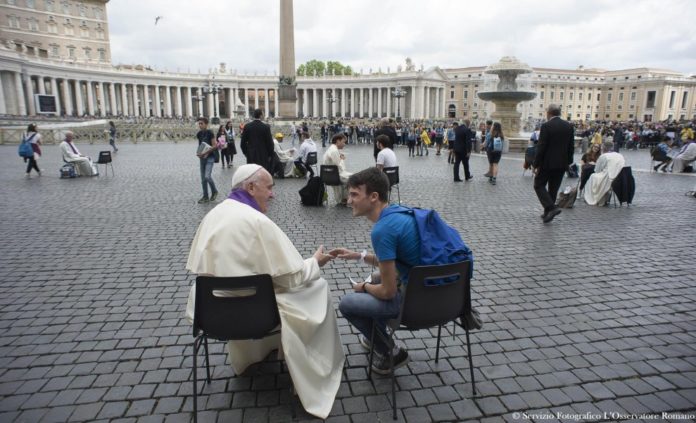Having explored the topic of psychological and spiritual empathy in previous blogs (3 April 2020 and 7 April 2020), we continue our exploration of this ethical attitude in the light of Pope Francis’ empathy.
A few months ago, I listened to Vatican Radio and heard the Pope respond to a young man who asked him, “Pope Francis, what can I say to a young man who is suffering?” Surprisingly, the Pontiff replied, “First of all, you don’t have to say anything. You have to… listen to him.” “Once,” the Pope recounted, “I listened to a person for 10 minutes, without saying anything. And at the end, this person told me: ‘Thank you, Pope Francis, for your help and your good advice”. And the Pope had said nothing…. “This means,” continues Bergoglio, “that when a person feels truly welcomed, listened to, esteemed and loved unconditionally with love-charity, the person begins to regain self-confidence and to find solutions to his or her problems on his or her own”. This is the way of true empathic listening!
From this anecdote, we can understand how much in his teachings, Pope Francis emphasises the value of empathy in the relationship with others: in welcoming, listening and dialogue. Indeed, in his address to the bishops of Asia in August 2014, he stated:
Nor can there be authentic dialogue unless we are capable of opening our minds and hearts, in empathy and sincere receptivity, to those with whom we speak. In other words, an attentiveness in which the Holy Spirit is our guide. A clear sense of one’s own identity and a capacity for empathy are thus the point of departure for all dialogue.[…]
Such empathy must be the fruit of our spiritual insight and personal experience, which lead us to see others as brothers and sisters, and to “hear”, in and beyond their words and actions, what their hearts wish to communicate. […]
This capacity for empathy enables a true human dialogue in which words, ideas and questions arise from an experience of fraternity and shared humanity. If we want to get to the theological basis of this, we have to go to the Father: he created us all; all of us are children of one Father. This capacity for empathy leads to a genuine encounter – we have to progress toward this culture of encounter – in which heart speaks to the heart.
Pope Francis, Meeting with the bishops of Asia, 17.08.2014.
Therefore, according to Francis, empathy implies the ability and the art of welcoming and listening authentically to others with the mind (cognitive empathy), with the heart (affective empathy), considering them as brothers and sisters “children of the same Father” (spiritual empathy).
Furthermore, in the message of the World Day of Peace (No 10), in January 2014, he reiterated: “Christ came into the world to bring us […] the possibility of sharing in his life. This good news of Christ requires from everyone, […] a perennial exercise of empathy, of listening to the suffering and hope of others”. Pope Francis thus clearly underlines how the proclamation of the new life in Christ requires an empathic and compassionate listening to the suffering of others (motivational empathy).
Finally, Francis recognises that empathy is an essential moral attitude for building a more fraternal society; as he points out in this 2016 address to the Council of Culture: “It is of fundamental importance to promote in society the growth of the level of empathy so that no one remains indifferent to the cries for help of his neighbour”. (prosocial empathy).
Therefore, as disciples of Christ, we can recognise how empathic listening and sincere acceptance of the other, with mind and heart, prove valuable evangelical and ethical attitudes in these difficult pandemic times. Through empathic listening, we become, for our brothers and sisters, witnesses to the compassionate support of Christ, who gives us confidence and, despite our suffering and human frailty, always opens a path of hope and resilience.
Fr. Mario Boies, C.S.R.
courtesy: Alphonsian Academy Blog, original is in Italian






